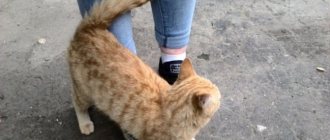In fact, cats are afraid not only of the vacuum cleaner, but also of any unfamiliar object, especially one that makes such noise. Even if our smaller brothers remain in the room, they still experience a feeling of fear, and this is very dangerous for their health. Let's try to figure out why a cat and a vacuum cleaner are completely incompatible things, and how they can exist in the same space. Moreover, this technique is a necessity in a home where there is a cat, especially if it is long-haired.
A cat and a vacuum cleaner are the main “grievances” of an animal
Cats are afraid of vacuum cleaners for several reasons. And today, we will look at each of them.
- As mentioned earlier, pets do not like noise, so they are afraid of vacuum cleaners. You can understand the cat, because the vacuum cleaner is twice its size. Just imagine if there was something working next to you that was twice your size. You would probably be scared too.
- Another reason why pets are afraid of the vacuum cleaner is the behavior of cat owners. Yes, yes, exactly in them. Very often, for fun, the owner of a cat deliberately scares the pet with a vacuum cleaner, drawing the pet's fur into this device. Yes, such a sight looks very funny, but think about your cat. At this moment, the poor thing is experiencing extreme stress. Therefore, for the safety of your pet, never try to “vacuum” your pet.
- Most cats see the vacuum cleaner as “an unknown monster. That is why they run away from him, hiding under the sofa, and watch the “monster” from afar. By the way, the bravest cats even fight with the vacuum cleaner.
Cats are cute, defenseless animals that need to be protected and protected from everything. That is why you should never scare a cat with a vacuum cleaner. It is best to accustom your pet to noise.
Reasons why cats are afraid of vacuum cleaners and other household appliances
There are objective reasons why animals are so afraid of a vacuum cleaner:
- The appliance is too loud. The fact is that a cat’s hearing is heightened. It is three times higher than that of humans. Therefore, the sounds that this scary machine makes are completely unacceptable for your four-legged friend. They frighten him with their volume. Imagine if you heard a vacuum cleaner making noise three times louder than it does now. You wouldn't like it either.
- The vacuum cleaner scares the pet with its very appearance. The car itself is just the size of a cat. She is even slightly larger than your pet. He is frightened by the dimensions and appearance of this device. The cat perceives this device as a real monster or monster. In addition, the animal does not understand why it is needed at all, and why the owner periodically uses it. The pet's reaction is comparable to the reaction of a person who happened to meet an alien. It's scary because you don't know what to expect from this unknown creature.
- The danger comes from the vibrations that come from the vacuum cleaner. A cat can sense an earthquake or other impending disaster. They have sensitive areas of the body for this - whiskers and special receptors on the pads of their paws. Thanks to them, they sense even minor fluctuations in the environment. The pet picks up vibrations from a running machine and perceives this as a signal of a threat.
- The fear arose through the fault of the owner. A person could turn on the vacuum cleaner when the pet was sleeping. The roar suddenly woke up the animal; from surprise and fear, it might not have had time to run away and hide. Careless handling of the pet is also possible. The owner might try to vacuum the cat as a joke. Under no circumstances should this be done. Such severe stress causes harm to the body. Also, you should never suddenly scare an animal on purpose.
How can you tell if your cat is afraid of the vacuum cleaner?
This can be determined by the main signs of fear:
- dilation of the pupils of the eyes;
- tousled fur;
- attempts to hide in a secluded place;
- the desire to escape from the room where the device is turned on;
- if you want to calm the animal and pick it up, it may bite and scratch;
- the pet may hiss and meow loudly;
- the desire to run out of an apartment or house through an open door or an open window.
Ways to reconcile a cat with a vacuum cleaner
Sounds made by other household appliances, such as a TV, are also unpleasant for cats' ears, but they get used to them much faster. How to accustom your pet to the sounds of a vacuum cleaner so that he stops running away from it.
Knowing why cats are frightened by a vacuum cleaner, experienced breeders give several recommendations, following which you can achieve, if not eliminate, then at least reduce the animal’s sense of fear of it:
- At first, do not hide the device from your pet: let him get used to its appearance;
- To make a shy cat make friends with the vacuum cleaner faster, leave a saucer with treats for your pet near the machine;
- after a little reconciliation, start briefly turning on the device at low power, gradually increasing it and the cleaning time;
- never have fun trying to “vacuum clean” a cat - these cruel games further injure the animal;
- If friendship between the vacuum cleaner and the cat does not work out, it is better to isolate the pet in the next room while cleaning.
Please note that under no circumstances should you forcibly accustom your cat to the sounds of a vacuum cleaner, no matter how much you might want to.
5/5 (2)
Many owners of furry couch potatoes are familiar with the situation when cleaning the apartment with a vacuum cleaner causes real cat hysterics in their pets. The cats get scared, hide in secluded places, begin to hiss, and some even try to attack the mechanical monster.
Let's figure out why an electronic device, which is found in almost every home, scares cats so much, and is it possible to make friends with it?
How to train a cat to make noise?
Few people know, but it is very easy to train a pet to noise. Naturally, it is much easier to accustom a small kitten to noisy sounds than an adult cat.
So what should you do to accustom your cat to noise and the vacuum cleaner?
- Leave the vacuum cleaner in a visible place so that your pet can sniff it and understand that there is no danger from this device.
- Never turn on the vacuum cleaner while your cat is sleeping near it. After all, your pet may get very scared and will never “make friends” with the vacuum cleaner again.
- Place a bowl of pet food next to the vacuum cleaner. So, the cat will very quickly get used to it and stop being afraid.
- When your pet lies near the vacuum cleaner, pet him and praise him.
If suddenly your cat continues to be afraid of the vacuum cleaner, then take care of her feelings and try not to turn on the vacuum cleaner in front of your pet.
How to behave if friendship doesn't work out
There is an opinion that the more often you vacuum, the faster the cat will get used to the technology. But cats are quite free-thinking creatures, and if the miracle of technology cannot be reconciled, then the owner needs to change his behavior; in no case should he act with violent methods with cats.
- While cleaning the premises, the animal can be sent for a walk, thereby not traumatizing its psyche. If the pet is not a street pet, then you can send it to the far corner of the house.
- In the modern world, completely silent vacuum cleaners are available for sale.
- In the end, if the relationship between your pet and the “monster” has reached a dead end, then you can use wet cleaning.
Having a furry pet in the house, the owner regularly faces the issue of cleaning carpets and sofas from the pet’s fur. And a vacuum cleaner is perfect for these purposes. If the owner approaches this issue wisely, then there should not be any special problems with putting the house in order. The main thing is not to use violent methods and take into account the psychological and physiological state of the cat.
Causes of cats' fear of vacuum cleaners
As mentioned above, the main role in this situation is played by noise, as well as the vibration that the vacuum cleaner creates. The sensations experienced by the animal when the unit is turned on will be similar to the feelings of a person who finds himself not far from a plane taking off.
On a note! Since cats do not tolerate noise well, during such procedures it is recommended to first move the pet to another room, especially if you have started renovations. This will help preserve his sanity.
But this is only the most obvious reason for fear.
Inappropriate jokes from the owner
Surely many of you have at least once tried to “capture” your pet with a vacuum cleaner by pointing a pipe at it that sucks in air. But in fact it is in vain. This way you only scared the animal:
- firstly, when wool gets into the brush, it is often unpleasant, although there are also “instances” that really like this kind of scratching; but, apparently, your cat is not one of them;
Such an act by the owner may prompt the animal to think that the vacuum cleaner is the most dangerous creature in the apartment. - secondly, the same terrifying sound became much closer, which is why violent panic appeared;
- thirdly, you could simply hit your animal with a massive pipe, after which it simply began to avoid repeated painful contact.
Rivalry
Some cats may see a vacuum cleaner not as a unit, but as a dangerous creature. And since this monster makes frightening sounds, and its dimensions are much larger than those of a cat, the pet instinctively begins to claim its rights.
The pet may rush at the vacuum cleaner, try to grab it with its claws and even pat it with its hind limbs
On a note! But only very brave representatives of the cat world can do this, since only desperate animals are capable of entering into an unequal battle with a huge “monster” in order to show their superiority.
Allergy to dust
Dust causes cats to sneeze, which is also unpleasant for them. And as you know, old vacuum cleaners can not only draw in dust, but also throw it back into the air. Moreover, they do the second much better than the first. So the pet tries to leave the contaminated area as quickly as possible. In this case, we can only advise changing the vacuum cleaner.
Where fears come from: features of physiology and psychology
The psychology of cats is designed in such a way that they perceive a vacuum cleaner as a great threat to themselves and the owner.
This happens due to the following reasons:
- Ordinary vacuum cleaners are always quite large; when moving them around the room, they make sounds that are frightening for cats, and therefore provoke instinctive fears in them.
- Cats can perceive a vacuum cleaner hose as a snake, the fear of which in cats, and other animals, is inherent at the genetic level.
- The whistle of the device is reminiscent of the hissing of cats when they are aggressive.
- As the vacuum cleaner moves across the floor, it sucks in everything in its path; this also frightens cats, reminding them of a predator.
Excellent hearing
Most often, cats are afraid of a vacuum cleaner not even because of its appearance, but because of the noise it makes.
The pet is frightened by an incomprehensible frightening roar and buzzing. Because of this, the animal tries to find a secluded place as quickly as possible, hiding there until the cleaning is completed. To scare a cat, only sound is enough. The same reaction can be observed to a hair dryer, mixer and other noisy household appliances. The same process occurs during repair work, fireworks or firecracker explosions on the street.
Cats have very sensitive hearing, so loud, sharp sounds often become unpleasant and frightening for them.
It should also be noted that the paw pads of pets perform the function of touch.
Reference!
They react to floor vibrations, warning of danger. This also explains the fact that cats are so afraid of vacuum cleaners. They perceive vibrations as a signal of approaching danger.
Too good eyesight
In the minds of cats, a bulky and incomprehensible object is associated with a terrible monster that can unexpectedly attack, causing harm. And if this “beast” begins to roar around the apartment, the cats begin to panic.
This is fine!
In such a situation, the pet’s main goal is to find the most secluded place and not get out of there until the enemy disappears.
Other cat fears
In order not to traumatize your pet’s psyche, remember what else they are afraid of.
What are cats afraid of?
- Cats are very afraid of objects that make too much noise. Hair dryers, blenders and other similar devices should be kept away from your pet.
- If a cat grows up in an apartment and never goes outside, it will be afraid of strangers. Therefore, at least occasionally introduce your pet to nature and the surrounding world.
- Pets are very afraid of the cold, so in winter, try to prevent the cat from freezing.
- Almost all cats, with the exception of a few breeds, are very afraid of water.
If you are raising a pet, then do not forget to give it affection, love and care. Always protect and protect your pet from danger, even in the form of a vacuum cleaner.
Bad first meeting
Why is a cat afraid of a vacuum cleaner? It is likely that the first acquaintance went down the drain . For example, a cat was basking on a windowsill in the rays of the July sun, and his sleep was shamelessly interrupted by a bass rumble from the next room. Of course, the first impression will not be pleasant, and in the future the device will evoke the same associations.
Don't interrupt your cat's sleep with cleaning! This is a surefire way to instill fear.
Sometimes the owners themselves create a negative experience for their pet when they try to jokingly clean the pet’s fur with a vacuum cleaner or run it over its paw. Often this technique causes fear in cats and a desire to hide far away. So the answer to the question of why a cat is afraid of a vacuum cleaner may lie in actions that are completely harmless from the point of view of the owners, but which cats perceive in a completely different way.
Transcendental rumble
The sound of a working vacuum cleaner leads to temporary disorientation of the animal.
In fact, there may be several reasons, one of which is associated with loud sounds coming from the bowels of the vacuum cleaner. According to scientists, cats have a wide range of hearing, capable of extending into the ultrasonic region beyond human range. A cat's ear can not only detect a squeak, rustle or rustle, but also accurately guess where exactly they are coming from. This property helps the domestic predator to hunt literally with its eyes closed, focusing only on sound sensations.
It is quite logical that the 80 decibels of a working vacuum cleaner causes incredible vibration in the cat's eardrums, which is not only painful for the pet, but also leads to temporary disorientation. In addition, the hum of household appliances for a cat is identical to the noise of a jet engine or an explosion in a minefield for the human ear. Hence the panic.
Reasons why cats are offended by the vacuum cleaner
- As we wrote above, noise and vibration play a major role. Imagine yourself in the place of your beloved cat - wouldn’t you be scared if planes started flying a few meters from your house? These are approximately the same emotions your pet experiences. By the way, these animals are afraid of even the quietest vacuum cleaners, although there are exceptions.
- Another problem is that many owners not only turn on the device in front of the pet, but sometimes even try to “capture” it by sucking in air. As soon as the pet's hair gets into the brush, it flies out of the room like a bullet. Therefore, such experiments cannot be carried out on animals, although some of them simply adore being “combed” in such a funny way. And there are quite a lot of such copies - you can see them, for example, on YouTube.
- Some cats see the vacuum cleaner not so much as a mechanical monster, which may in fact pose no danger, but as their rival. That is why some of the pets not only do not run away from the room, but remain looking at the “monster”. In some cases, they even try to fight with him, showing their superiority, but this fight leads to nothing.
- Another possible reason for fear of mechanical devices is an allergic reaction to dust. This is especially true for those apartments where ancient vacuum cleaners are used - they not only do not draw in dust, but sometimes even “spit it out” back. In this case, the cat begins to sneeze, so it leaves the room. The most optimal solution to the problem is to replace the vacuum cleaner with a newer model.
Uncertainty and horror
All living beings, as well as people, can calmly perceive the existence of those things that are as simple and understandable as possible. This concerns the properties and characteristics of the object. But all incomprehensible phenomena are always perceived with caution by the creature. Even people are afraid of new events and phenomena. What can we say about animals? The vacuum cleaner has an incomprehensible and surprising shape, and most likely, according to the cat, it makes creepy sounds.
© shutterstock
It is clear that the cat will react to it the same way a person would react to a landing flying saucer. The cat cannot assess why a vacuum cleaner is needed and whether it is fraught with danger. Here, all the cat’s instincts will seem to signal impending danger. The cat will run away from her.
How to rid a cat of vacuum phobia
If the owner is confident in his abilities as a trainer, then teaching the cat to calmly accept the vacuum cleaner is a completely doable task. True, this will require a lot of time and patience, but if you are firm in your intentions, feel free to try your hand, gradually overcoming stage by stage.
First, accustom the animal to the appearance of the monster by leaving it for a long time in the middle of the room.
A delicacy placed nearby will give the unit a special charm. When the purr gets used to the presence of the vacuum cleaner, you can try to carefully turn it on at the lowest speed for a few seconds. The animal should not sleep or rest, otherwise the unexpected noise will still frighten it. Gradually increase the noise level and operating time of the device
When the mustache ceases to be afraid of sound, it will be possible to add careful movements. If, despite all the efforts made, the cat does not want to come to terms with the presence of this monster in the house, you will have to give in. Buy a more modern gadget - a robot vacuum cleaner, which makes virtually no sounds and does not have a scary wriggling arm. If you can’t afford such a purchase, remember the old-fashioned method of wet cleaning.
Cats are actually
all household noises - hair dryer, vacuum cleaner
, a food processor, even a microwave can be afraid. What can we say about construction noise - drill, jigsaw. During renovations in the apartment, it is better to move the cat to relatives and friends, since renovations are a stressful situation for her.
She is just an animal, and she is not able to assess the degree of danger of a vacuum cleaner - she is frightened by incomprehensible loud sounds and the vibration of household appliances. After all, even people are afraid of bombing, and some even of thunderstorms. What can you ask from an unreasonable cat
, no wonder they are afraid of the vacuum cleaner
and perceive him as an enemy. Hearing such a noise, he must be thinking something like “they’re bombing!!! air raid!!!" , and rushes for cover.
Acoustic impressions
A cat's delicate hearing easily picks up even the rustling of a mouse behind the wall. What can we say about the effect that the terrible roar of the engine has on the sensitive membranes. Sometimes it can even cause physical pain to the animal. In addition, the purr does not understand the purpose of the sounds it makes. What is this: a warning, a threat or a signal to attack? Additional irritation lies in the inability to hear other surrounding sounds that may signal the approach of real danger. Or you might miss an invitation to dinner, which is even worse!
Vibrations
Experts name another reason that explains why cats are afraid of the vacuum cleaner. Sometimes our pets are afraid not of the appearance of the device or the noise it makes. Cats are able to detect the slightest vibrations on the surface of the earth: remember the well-known facts when cats are the first to show concern even before a person feels the first weak tremors of an earthquake. They pick up the weakest vibrations, while experiencing the strongest excitement, anticipating danger. It is in order to protect itself from it that the cat hides in a safe place.
Increased seismic sensitivity
Almost all animals, including cats, have the ability to predict various natural disasters: earthquakes, tsunamis, volcanic eruptions. The mustachios are warned of impending danger by their amazing talent of feeling even the faintest vibrations with their paw pads. Therefore, the strong vibrations generated by a running vacuum cleaner motor cause the cat almost the same suffering as a loud sound. Oscillatory movements transmitted along the surface of the floor trigger the instinct of self-preservation, prompting the pet to immediately flee to a safe place.
Vibrations and fluctuations
Many cats are afraid not of the sound or appearance of a household appliance, but of the vibrations it makes. Representatives of felines very keenly sense any vibrations on the surface of the earth (this is confirmed by the fact that sensitive animals usually begin to worry even before a person feels the first tremors of an earthquake). Pets that pick up the slightest vibrations experience great anxiety, sensing impending danger. To protect itself from it, the cat tries to climb into a safe place.
Visual perception
Vision is the first to warn the cat of danger: a structure of an incomprehensible shape has appeared in the house, which rushes around all the rooms and climbs with its long “trunk” into all corners. Suddenly it's looking for me! This monster easily makes its way to its favorite chair, travels along a cozy couch and wraps itself around the house. His wriggling hose resembles a snake, about to entangle and mercilessly crush a small defenseless body. Only immediate flight will avoid a terrible fate!
Causes of fear of water in cats
The first cases of domestication of cats were known more than 9 thousand years ago. It is not entirely clear why cats began to live next to humans. Presumably, wild cats settled near human habitation due to the presence of rodents, which in turn actively reproduced near human habitation.
Despite thousands of years of living next to humans, cats still remain a little wild. From a very early age, these animals hone their skills as hunters and always try to be prepared for dangerous situations. In this regard, cats do not like to be wet, because being in this state the animal will not be able to fully defend itself and run. Most cats have a thick undercoat that absorbs moisture and stays wet for a long time.
The main reasons why cats are afraid of water are:
- Risk of getting sick. Cats have fairly large ears in relation to their head. The larger the ears, the higher the risk of water getting inside the ear. Deep ear canals cannot be quickly rid of water. Remaining moisture can provoke the development of an inflammatory process - otitis media. Cats, being independent animals, rarely show any discomfort they are experiencing. An ear infection, if not treated promptly, can cause inflammation in the brain area. On a subconscious level, cats try not to come into contact with water in order to avoid such negative consequences.
- Possible hypothermia. The thick undercoat that cats have is capable of absorbing moisture like a sponge. When the wool gets wet, the animal takes a long time to dry. Against this background, the pet feels severe discomfort and is depressed. In addition, hypothermia occurs in the body, causing a decrease in defenses. Against the background of decreased immunity due to hypothermia, various infections may develop or chronic diseases may worsen. The most dangerous thing is for a wet cat to be in a room with air conditioning running. Cat owners who are diagnosed with pneumonia due to hypothermia contact veterinarians quite often.
- Specific smell of water. Cats do not have as great a sense of smell as dogs, but it is 14 times better than humans. On the nasal planum of the animal there are about 70 million cells responsible for the sense of smell. Humans have only 7 million olfactory cells. Running water from the water supply system, coming through pipes, is purified using various chemical compounds. Cats rarely like the smell of water, so the animal tries not to come into contact with this liquid. Of course, this is not the main reason for a cat’s dislike of water, but it does not need to be ruled out. If your pet does not like to bathe, you may want to choose filtered water free of chemical impurities or water from a well.
Not all cats are afraid of water. There are a number of breeds that, on the contrary, will not refuse to take a bath with their owner. Most hairless cats have this feature. Powerful, handsome Maine Coons are considered true lovers of water. The largest of the domestic cats, exceeding the weight of most decorative dog breeds, Maine Coons were used by people to catch rodents on ships. Over time, this need disappeared, but the lack of fear of water remained.
Bengal cats are recognized as true connoisseurs of water treatments. This breed of cat was developed in the 60s during breeding work by crossing a black domestic cat and a Bengal cat. Bengals adopted from their wild ancestor a lack of fear of water and a peculiar disposition.
Famous lovers of swimming in water are cats of the Turkish Van breed. These cats are quite large, with well-developed muscles. The peculiarity of these cats is that the Turkish Van has practically no undercoat. Therefore, when wet, the fur dries faster without causing severe discomfort to the animal.
American bobtails, which are similar in character to dogs, are not afraid of water. The Egyptian Mau cat has a positive attitude towards water.
veterinarian - the answer will be sent to your email
Popular makes and models
It should be noted that wool cleaning machines are in a high price category. This is explained, first of all, by the presence of turbo brushes in the kit.
Dyson
The British manufacturer has the largest range of models. There are all types of vacuum cleaners: multicyclone with two turbo brushes, vertical cordless devices. They implement a number of engineering solutions: carbon fiber fibers, recognition of the type of floor covering, Ball technology (the vacuum cleaner is built in the form of a ball in which all the main elements and electronics are located). They do not require consumables, and the suction power does not decrease over time. In addition, the manufacturer provides a 5-year warranty on its products.
Such vacuum cleaners are not cheap at all: vertical ones start from 12 thousand rubles*, others - from 27 thousand.
Miele
The dust bags are absolutely hygienic.
This premium German brand has a special model for cat and dog owners: Miele SGEA0 Complete C3 Cat&Dog.
The obvious advantages of this vacuum cleaner for cat hair is the high-performance PowerLine motor, which, with reduced energy consumption, shows quite decent suction power. In addition to a universal set of brushes, it includes a turbo brush for cleaning hair. Well, perhaps the most important advantage is German assembly and a 2-year warranty. This model uses dust bags. At the same time, they do not have the obvious disadvantages of their cheaper counterparts.
The disadvantages include the high price and the need to buy bags, which are also not cheap.
In addition, almost any model from this manufacturer can be adapted for collecting wool; just buy a special turbo brush, depending on the model of the vacuum cleaner. But they cost the same as an average vacuum cleaner - about 9 thousand rubles.
LG
Here, many models are also equipped with turbo brushes, so choosing a vacuum cleaner for cleaning your pet’s hair will not be difficult: the prices are quite affordable, everyone will find a copy upon request. Another thing is that this brand does not produce a special model for dog breeders.
One of the distinctive features of the South Korean manufacturer’s products is the Kompressor waste pressing technology. Thanks to this, the capacity of dust collection containers is much higher.
Electrolux
The UCANIMAL model is produced specifically for cleaning pet hair. This is a good vacuum cleaner if there is a cat in the house. It differs from the rest of the UltraCaptic lineup only in the presence of a turbo brush. The only alarming thing is the suction power - 300 W, and the price from 18,000 rubles.
Thomas
The main advantage of an aquafilter is a high degree of air purification.
This manufacturer also has a special model for collecting dog and cat hair - Thomas Perfect Air Animal Pure. The name speaks for itself: the main thing here is not to vacuum, but to clean the air. And the manufacturers of Thomas equipment approached this matter with all responsibility. This device has a turbo brush and a special nozzle for furniture with a thread remover. Dust is collected in an aquafilter, which retains almost 100% of dust. The water filtration system causes considerable size and weight, as well as the need for maintenance after each cleaning.
To summarize, we can say that not all manufacturers strive to produce specialized vacuum cleaners. In the model range of each brand you can find models with a turbo brush as a budget option. If the buyer is ready to spend a larger amount, then vacuum cleaners for cleaning hair from premium brands will attract his attention. In them you can find those options that are inherent in the “Cat&Dog” category.
How to rid a cat of vacuum phobia
If the owner is confident in his abilities as a trainer, then teaching the cat to calmly accept the vacuum cleaner is a completely doable task. True, this will require a lot of time and patience, but if you are firm in your intentions, feel free to try your hand, gradually overcoming stage by stage.
First, accustom the animal to the appearance of the monster by leaving it for a long time in the middle of the room.
A delicacy placed nearby will give the unit a special charm. When the purr gets used to the presence of the vacuum cleaner, you can try to carefully turn it on at the lowest speed for a few seconds. The animal should not sleep or rest, otherwise the unexpected noise will still frighten it. Gradually increase the noise level and operating time of the device
When the mustache ceases to be afraid of sound, it will be possible to add careful movements. If, despite all the efforts made, the cat does not want to come to terms with the presence of this monster in the house, you will have to give in. Buy a more modern gadget - a robot vacuum cleaner, which makes virtually no sounds and does not have a scary wriggling arm. If you can’t afford such a purchase, remember the old-fashioned method of wet cleaning.
Date: 04/02/2016.
Photo: pixabay.com
Selection criteria, how to choose the right model
Most often, it is indicated only in the attached manual.
A significant advantage for a vacuum cleaner for dog hair will be the presence of two brushes in the kit: large and small. If the household appliance comes with only one, then the second brush will have to be purchased separately, which entails additional costs.
Another important point when choosing a vacuum cleaner for collecting hair is the suction power. Manufacturers like to write power consumption in large numbers, which looks very respectable: 1500 W, 2000 W. However, it has nothing to do with the suction power, which is usually in the range of 350 - 500 W. The optimal power for vacuum cleaners for cleaning hair is 400 W and above.
Now many manufacturers are striving to increase the efficiency of their turbo brushes by introducing innovations: a special “thread lifter” for lifting threads and hairs, original attachments on the turbo brush, other mechanisms for capturing hair, an attachment for a vacuum cleaner for combing dogs.
Curious facts
The love of furry purrs works wonders. It doesn’t cost a smart owner anything to find an approach to the pet’s character and rid him of any fear. But it is useful for the owner of the purring miracle to learn some interesting things about his furry.
The best vacuum cleaner for cats
How to choose a cleaning unit so that training a cat to noise can be reduced to a minimum of time? Which vacuum cleaner is better to buy? Please note that the dust collector will not only have to “be friends” with the cat, but also carefully remove its hair (this is important for owners of long-haired cat breeds). When choosing, pay attention to the name of the cleaner model. If there are words: “cat/dog”, “pet” and “animal” - these devices are created for animal lovers
If there are words: “cat/dog”, “pet” and “animal” - these devices are created for animal lovers
When choosing, pay attention to the name of the cleaner model. If there are words: “cat/dog”, “pet” and “animal” - these devices are created for animal lovers
The main difference between these models is the built-in turbo brush. This is a special attachment with a rotating brush designed for cleaning wool. During the work process, the smallest hairs, threads, and hairs are wound onto the roller.
Pay attention to the way the turbo roller functions. There are two of them:
- Mechanical. The brush works thanks to the air flow.
- Electric. The turbo roller moves using an electric drive.
Electric turbo brushes are more effective for cleaning an apartment where animals live. Some models feature self-cleaning brush technology. The owner presses a button, and sharp knives appear to shred the garbage - the remains are sucked into the dust collector.
Rollers are available in two versions: large for rugs, carpets, paths and mini - necessary for cleaning chairs, sofas and pillows, where cats love to lie. But what about those animals that have not become accustomed to the sound of the dust collector? Cats' best friends are automatic vacuum cleaners.
Robot vacuum cleaner. Models of this rank are initially equipped with electric turbo brushes. These vacuum cleaners are suitable for purring owners who, despite the owner’s efforts, are not accustomed to noisy dust collectors. What are the advantages of robots?
No hose. The wriggling tube frightens the cat, who mistakes it for an enemy snake. Silence
The robot makes noise when working, but much less than its huge brother, which helps animals not pay attention to it. Small sizes. Robots are small in size, they are compact and similar in volume to purring pets
Tiny household assistants will not frighten cats as much as ordinary vacuum cleaners.
Over time, any purr who does not like noise will get used to a constantly working, nimble vacuum cleaner with its quiet buzzing. The only thing to consider when buying a robot vacuum cleaner is whether it has a “virtual wall” function.
This ability helps to avoid obstacles in the form of cat bowls and litter boxes when working. Take a closer look at automatic workers equipped with a UV lamp. Ultraviolet light during cleaning kills flea larvae, dust mites and disinfects surfaces.
What else are cats afraid of?
We should also not forget about other common fears among cats:
- fear of cold. Cats do not tolerate frost well, so try to close the windows tightly and create a warm and cozy corner in the house for your pet;
- household appliances that make a lot of noise (blenders, mixers, etc.). Try not to frighten cats by abruptly turning on such devices;
- sometimes cats may not go for a walk due to fear of unfamiliar surroundings and surroundings;
- moisture. However, all cats have different relationships with water. Some people love water procedures, while others find it difficult to bathe.
Treat your pets more carefully and you will earn their trust.
What else are cats afraid of?
Cats are afraid of a lot of things, but their main fear is noise.
Our beloved furry creatures are quite timid creatures, and they are afraid of many things. Here is a sample list of what might scare your pet:
- Loud noise is the first thing that scares cats. This applies not only to the vacuum cleaner, but also to other devices that produce it, such as a home processor, hair dryer, drill, and even powerful sounds from what is happening outside the window.
- In addition, cats can be frightened by strangers. The reason is that from an early age they are exclusively with the owner, and they are either not used to new meetings or have negative experience (for example, if the kitten was offended). Therefore, the animal may not perceive friends coming to visit you in the best way. Sometimes a cat's aggressive behavior can be explained by simple jealousy.
- Cats are afraid of other animals. Their first enemy is a dog, but ferrets, chickens or geese, and even other felines can also cause fear.
- Fluffy pets do not perceive movements well. We've already mentioned that riding in a car can be very frightening for them. They also do not like closed spaces, such as elevators.
- Cats don't like the cold either. Despite the warm fur coat, it is unlikely that any cat will want to stay in the cold for a long time. They tolerate heat much easier.
- Everyone also knows that cats are afraid of water. Those who have ever bathed an animal know this firsthand.
Do you know why cats sleep on people's feet and on people's feet?
Many owners have cats that love to climb on tables. Find out how you can stop your cat from climbing on tables.
Thus, you can train your cat to use a vacuum cleaner. But what to do if you have already tried all the methods and nothing has brought results. Then you can simply lock the cat in another room while cleaning or, if possible, send it for a walk outside.
What is prohibited to do
To people, a cat’s fear of a vacuum cleaner seems incomprehensible and more far-fetched. They do not want to listen to the pet’s feelings and behavior, leading him to panic attacks and hysteria with household appliances. There are a number of prohibited actions that should not be taken under any circumstances when teaching a cat to use a vacuum cleaner, or if this is still not possible:
- Lock the animal in the same room with a running vacuum cleaner if there is no place to hide . If the measures taken to treat fear do not produce results, some owners deliberately lock the pet in a room with a device, thinking that the cat will not be afraid forever and will calm down in a few minutes. Doing this is strictly prohibited. The consequences of such actions can be unpredictable. If the vacuum cleaner catches a cat indoors, it should be sure to provide an escape route.
- If the cat is afraid of the vacuum cleaner, turn on the device while he sleeps . If it is so urgent to clean the room, it is recommended to move the pet to another room or wake it up. A rash action will lead to great stress in the animal, which can cause various nervous diseases to appear over time.
- Bring a vacuum cleaner close to a pet that finds itself in a hopeless situation . If there is no place to hide, and the cat is sitting on the sofa, huddled in a corner out of fear, you need to turn off the vacuum cleaner, give the pet a chance to calmly leave the room, and only then continue cleaning.
- Remove the cat from under the furniture using the handle of a vacuum cleaner . This is what some owners do, guided by the rule of “knocking out a wedge with a wedge.” Under no circumstances will the cat leave its hiding place, and it can hide so far that it will be difficult to get it out. The pet itself will not come out, since it will experience a feeling of fear for a very long time.
- Bring your cat near a running vacuum cleaner. This is what true extreme sports fans like to do, not knowing how long and difficult it takes for wounds from cat claws to heal. A separate category of owners, trying to demonstrate the safety and harmlessness of the vacuum cleaner, take the pet in their arms and carry it to the switched on device, thinking that this way the animal will be able to get used to it faster. The result of such attempts is severely scratched hands of a person, up to the need to go to the hospital. After such actions by the owner, the animal’s fear of the vacuum cleaner will never go away, and no training measures will help.
Knowing that cats are afraid of the vacuum cleaner, it needs to be eradicated from the moment the baby appears in the house. This should be done gradually, without rushing and without scaring the pet even more. It is almost impossible to convince an adult animal that a household appliance is safe. You can take a week to train, turning on the vacuum cleaner a little every day and leaving it in a visible place. If all attempts are in vain, nothing can be done about it. Every time before cleaning the room, you will have to warn your pet about the vacuum cleaner and give him time to reliably hide from the growling, giant “monster”.
Owner's carelessness
Cats often start to panic when the vacuum cleaner is turned on. And all this is because the introduction of the animal and the device occurs suddenly, when the pet is absolutely not ready for it. For example, a cat is absolutely defenseless when it sleeps. There is a category of people who turn on the vacuum cleaner only at times when it is convenient for them. The vacuum cleaner appears to the cat as if out of the ground and naturally makes a terrible impression on the animal. Once and for all, the cat begins to be afraid of technology. There are irrepressible owners who also have fun when they see the animal’s panic reaction.
How to teach a cat not to be scared of a vacuum cleaner?
To prevent your pet from getting scared, felinologists recommend following these recommendations:
- The household appliance does not need to be hidden in the closet; it is better to periodically leave it turned off in the center of the room so that your four-legged friend gets used to it. Having gotten rid of the fear of the unknown, the cat will quickly get used to the vacuum cleaner.
- Before turning on the equipment, felinologists recommend playing with the animal to improve its mood.
- There is no need to turn on the device suddenly; you should warn the cat about your actions and gradually increase the power.
- To reinforce positive associations, you can place a plate of food near the switched off appliance. It is strictly forbidden to turn it on - you need to give the animal a few days to get used to it. Over time, even if the owner is vacuuming, the cat will still approach the equipment when it feels hungry.
- It is prohibited to close the doors of the room in which vacuuming is being done. The cat must have freedom of action to come closer or run away.
- It will not be possible to teach a pet not to be afraid by using force, which is why felinologists prohibit carrying a pet in your arms to a noisy device. Such a procedure will only worsen the phobia and increase antipathy.
Studies have found that cats distinguish intonations in the human voice, and not the meaning of specific words, so the animal can be calmed if you speak to it gently and kindly.
If the recommendations do not help restore the relationship between the pet and the equipment, then felinologists recommend taking the cat to another room or letting it out for a walk during cleaning. If it is not possible to remove the animal, you need to wait until the cat sleeps and eats, as this will help reduce stress levels. Your pet should be praised and petted every time it approaches the vacuum cleaner. You can give treats as a reward for good behavior.
Source
What to do?
Many owners want to wean their pets from the fear of the vacuum cleaner, but do not know how to do it correctly. There are a few simple tips to help people get cats accustomed to loud noise from electrical appliances:
- It is best to store the vacuum cleaner in an open place accessible to the cat (you can even temporarily place the animal’s bowls with food and water next to the electrical appliance). This is necessary so that the animal, in a calm environment, can approach the object of its fear, examine it and sniff it. Once the cat gets used to the household appliance, it will begin to respond more adequately to it during cleaning.
- When turning on the vacuum cleaner, you need to select the lowest power and only gradually increase it to the maximum. It is best to turn on the device for just a couple of minutes at first. This is necessary so that the cat gets used to quiet noise and calmly perceives louder sounds.
- You should not turn on the vacuum cleaner when your pet is sleeping peacefully on its bed or on the sofa. During sleep, the animal is in a relaxed state and does not expect a trick. If at this moment the owner starts vacuuming the floor, the cat may experience severe panic, which can turn into chronic stress.
- In order not to bring the cat to nervous exhaustion, the owner must, before cleaning (even before turning on the buzzing unit), give him the opportunity to leave the room and hide in any secluded place. If you turn on the vacuum cleaner while the fearful pet is still in the room, the animal may become even more frightened, which means it will not be possible to establish contact with the household appliance.
- You need to gradually accustom your animal to a vacuum cleaner. However, it is best to do this when the kitten is still very young. It will be much easier for a young animal than for an adult cat with its own character traits and habits to get used to a noisy object.
- If the animal cannot get used to a loud, vibrating household appliance, the owner needs to think about changing the vacuum cleaner. The stores offer a wide selection of similar household appliances, including very compact and almost silent models.











